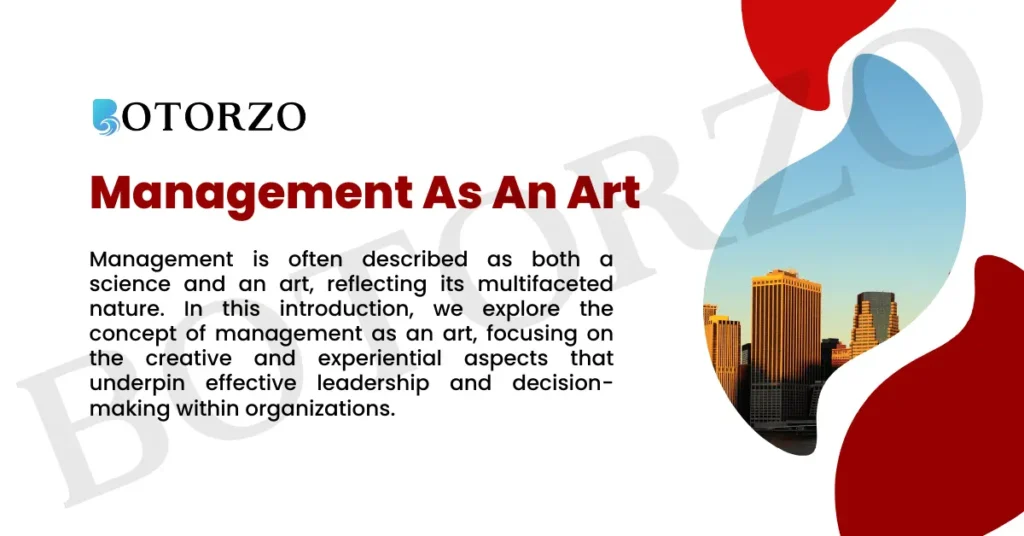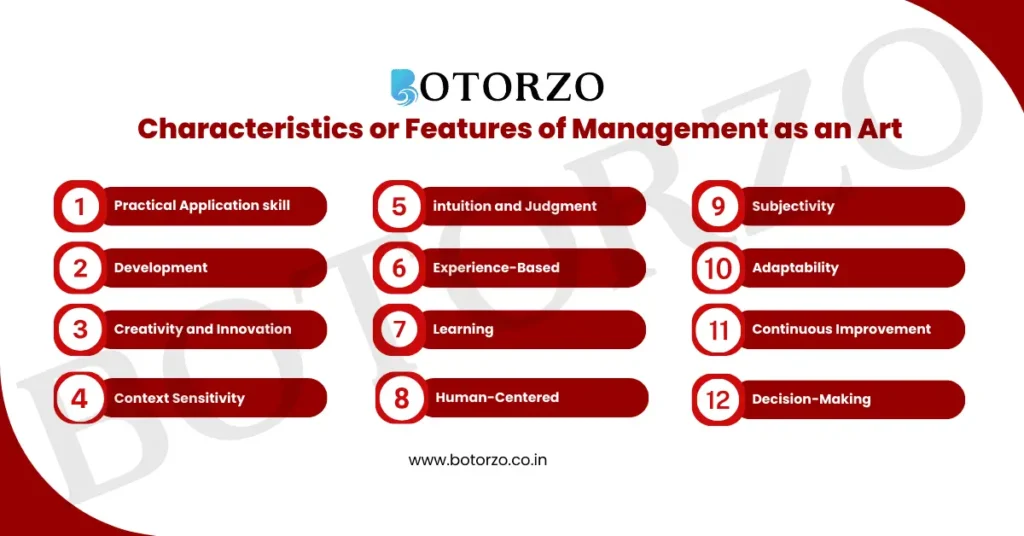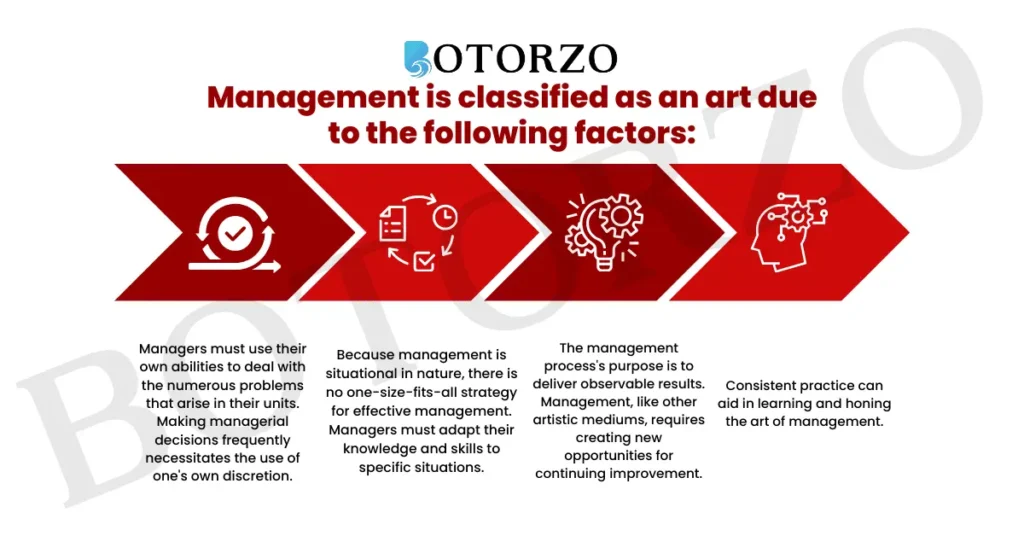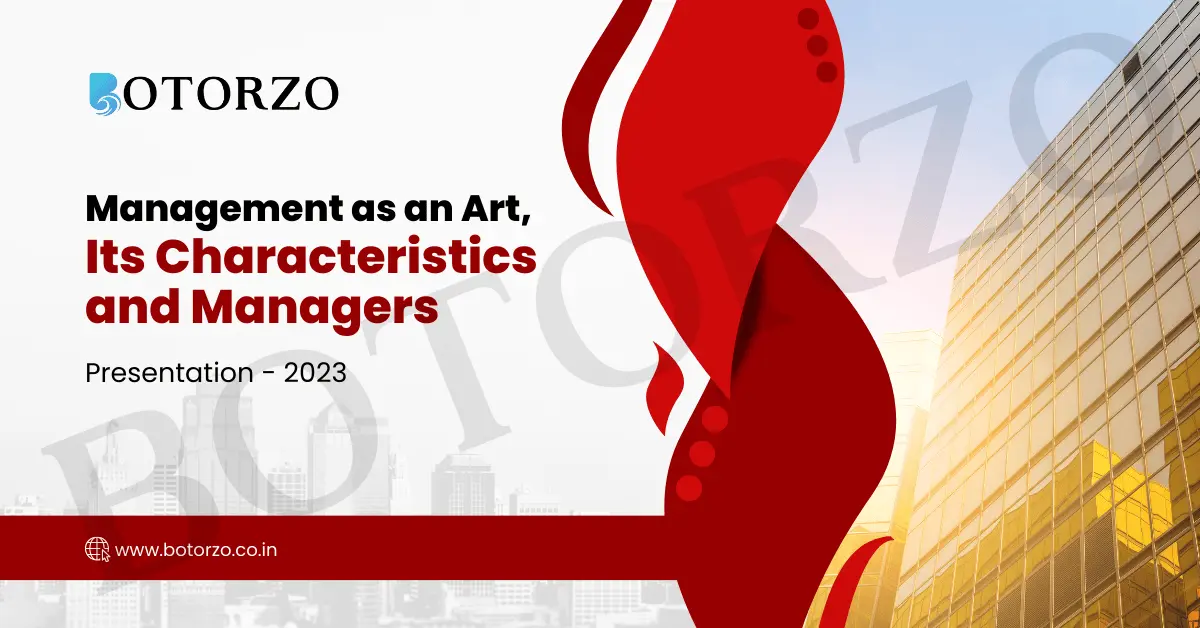Management is often described as both a science and an art, reflecting its multifaceted nature. In this introduction, we explore the concept of management as an art, focusing on the creative and experiential aspects that underpin effective leadership and decision-making within organizations.

The idea of management as an art suggests that it involves a creative and skillful application of principles, knowledge, and techniques to achieve specific goals. While the term “art” may conjure images of painting or sculpture, in the context of management, it refers to the practical, human-centered aspects of the discipline. Art in management is about the nuanced, context-specific, and often intuitive application of managerial skills.
Characteristics or Features of Management as an Art

Art is the use of facts and personal experience to achieve certain aims while referencing scientific principles and understanding. Art is concerned with the practical application of information, whereas science is concerned with the acquisition of knowledge. The following are the essential elements of management as an art:
- Practical Application
- Skill Development
- Creativity and Innovation
- Context Sensitivity
- Intuition and Judgment
- Experience-Based Learning
- Human-Centered
- Subjectivity
- Adaptability
- Continuous Improvement
- Decision-Making under Uncertainty
- Interpersonal Skills
- Customization
- Problem-Solving
- Leadership and Vision
- Body of Knowledge
- Creativity
- Practice
- Personalized Knowledge
Read More From fundamentals-of-management
Practical Application: Management is not confined to theory alone; it involves applying knowledge, techniques, and strategies to steer organizations toward their objectives. Managers are akin to artists who bring the canvas of their organizations to life.
Skill Development: Just as a painter refines their brushwork and a musician their instrument, managers hone various skills. Communication, decision-making, and leadership are among the skills that require continuous development to effectively manage and lead teams.
Creativity and Innovation: Like artists, managers often find themselves in situations that demand creativity. Whether it’s devising new marketing strategies or solving intricate operational puzzles, the art of management encourages innovative thinking and problem-solving.
Context Sensitivity: Recognizing that organizations operate within unique contexts, effective managers adapt their approaches accordingly. They understand that what works in one setting may not work in another, and they tailor their strategies to fit the specific circumstances.
Intuition and Judgment: The artful aspect of management is evident when managers rely on their intuition and judgment. In the absence of complete information, they make decisions guided by their expertise and experience.
Experience-Based Learning: While the scientific foundation of management provides essential principles, true proficiency is cultivated through hands-on experience. The art of management is learned through real-world challenges and problem-solving.
Human-Centered: At its core, management is about working with people. Understanding human behavior, motivations, and dynamics is a fundamental element of this art, as managers guide individuals and teams toward common goals.
Subjectivity: The art of management is not rigid or absolute; it allows room for subjectivity. Managers make decisions and take actions influenced by their personal viewpoints and the specific circumstances they face.
Adaptability: Just as art evolves with new techniques and styles, effective management requires adaptability. Managers must adjust their strategies in response to changing markets, technology, and internal dynamics.
Continuous Improvement: Just as artists refine their craft over time, managers continually seek to improve their skills and approaches. They learn from successes and setbacks, enhancing their ability to navigate the complexities of organizational life.
Decision-Making under Uncertainty: Much like a skilled artist creating a masterpiece without a clear picture of the outcome, managers often make decisions under conditions of uncertainty. Their creativity and judgment guide them in crafting solutions in unpredictable situations.
Interpersonal Skills: Strong interpersonal skills are crucial in the art of management. Managers must inspire, motivate, and collaborate with individuals from diverse backgrounds, addressing conflicts and nurturing relationships to achieve common goals.
Customization: Just as an artist tailors their work to reflect their vision, managers customize management principles to align with the unique needs and objectives of their organizations. One-size-fits-all solutions are rarely effective.
Problem-Solving: Managers are akin to problem-solving artists. They identify challenges within their organizations, whether related to operations, market changes, or personnel issues, and work creatively to address them.
Leadership and Vision: Effective management involves visionary leadership, much like an artist with a clear vision for their work. Managers inspire their teams, offering guidance and direction to pursue shared purposes and long-term objectives.
Body of Knowledge: Management, as an art, draws upon a well-established body of knowledge. This knowledge comprises theories, models, and principles developed through years of research and practical experience. Just as a painter understands the techniques and styles of different art movements, managers are equipped with the theories and principles that underpin effective organizational governance and leadership.
Creativity: The art of management encourages creative thinking and problem-solving. Managers often find themselves in situations where conventional approaches may not suffice. Just as an artist uses their imagination to create unique works of art, managers employ creativity to develop innovative strategies, products, and solutions to address the ever-evolving challenges in the business world.
Practice: Similar to artists who refine their techniques through constant practice, managers develop their skills and judgment through practical experience. It’s through the day-to-day management of projects, teams, and operations that managers fine-tune their ability to apply theoretical knowledge in real-world scenarios. The practice of management is a dynamic process that involves learning from both successes and failures.
Personalized Knowledge: Effective managers often leverage personalized knowledge. This refers to the tacit understanding gained through their unique experiences, organizational culture, and industry-specific insights. Like seasoned artists with distinct style, managers apply their personalized knowledge to tailor solutions and decision-making to the specific needs of their organization and its people.
Read More From Engineering
Management is classified as an art due to the following factors:

The application of concepts, principles, and procedures in management is a fundamental component of managerial practice.
- Managers must use their own abilities to deal with the numerous problems that arise in their units. Making managerial decisions frequently necessitates the use of one’s own discretion.
- Because management is situational in nature, there is no one-size-fits-all strategy for effective management. Managers must adapt their knowledge and skills to specific situations.
- Consistent practice can aid in learning and honing the art of management.
- The management process’s purpose is to deliver observable results. Management, like other artistic mediums, requires creating new opportunities for continuing improvement.
Management as an Art in the Context Of Managers
Every manager relies on a combination of their knowledge of management concepts, principles, and techniques, as well as their interpersonal skills when working with individuals in pursuit of specific outcomes. Shaping the attitudes and behaviors of individuals within the workplace to align with the achievement of organizational goals is a highly sophisticated art form. In the realm of management, this art necessitates a collection of abilities, sound judgment, and the continual application of management theories and principles.
Management is often regarded as an age-old art because the practice of guiding and motivating employees to accomplish tasks and objectives has historical roots that extend far back in time. The idea of getting work done through people is not a novel concept for contemporary organizations. However, it’s important to note that management, unlike certain fine arts like music and painting, does not achieve a state of perfection. This is due to several factors that distinguish management as a unique form of art.
The effectiveness of a manager is contingent upon various factors. First and foremost, it hinges on their personal skills, such as their ability to communicate, lead, and make decisions. Furthermore, the types of individuals they are managing play a crucial role. People vary in their motivations, behaviors, and responses to management techniques, requiring managers to adapt their approaches accordingly. Additionally, the specific situation faced by a manager can significantly influence their managerial choices and actions. Context matters, and what works in one situation may not be suitable in another.
In contrast to a musician who can repeat a musical composition consistently, a manager may not be able to apply the same management principles and techniques uniformly over time. This is primarily because the field of management is marked by a dynamic and ever-changing environment. Circumstances evolve, and what was effective in the past may need modification to remain applicable in the face of new challenges or opportunities. Therefore, the art of management involves a continuous process of adaptation, learning, and creative problem-solving to address the unique and evolving demands of the organizational world.
Frequently Asked Question
What is the fundamental difference between management as a science and management as an art?
Management as a science involves the study and understanding of principles and theories, while management as an art focuses on the practical application of this knowledge, often requiring creativity and adaptability.
Why is creativity considered an essential aspect of management as an art?
Creativity in management is crucial because managers often face unique and complex situations that demand innovative solutions and approaches to address organizational challenges effectively
How does the context influence management as an art?
The context significantly impacts management as an art because there is no one-size-fits-all solution. Managers must adapt their approaches to the specific circumstances and challenges they encounter within their organizations.
Why is it important for managers to develop their interpersonal skills?
Interpersonal skills are vital in management because managers must motivate, inspire, and collaborate with individuals from diverse backgrounds, resolve conflicts, and nurture relationships to achieve common organizational goals
What is meant by “personalized knowledge” in the context of management as an art?
Personalized knowledge refers to the tacit understanding gained through a manager’s unique experiences, organizational culture, and industry-specific insights. Managers apply this personalized knowledge to tailor solutions and decision-making to the specific needs of their organization and its people.
Why is management often considered an age-old art?
Management is regarded as an age-old art because the practice of guiding and motivating employees to achieve tasks and objectives has historical roots. The concept of getting work done through people is not new to modern organizations.
What distinguishes management as an art from fine arts like music and painting?
Management, unlike fine arts, does not achieve a state of perfection. This is primarily due to its dynamic and ever-changing nature, where managers must adapt their approaches to evolving circumstances and challenges
Why is continuous improvement emphasized in the art of management?
Continuous improvement is vital in the art of management because managers continually seek to enhance their skills and approaches. They learn from both their successes and setbacks, adapting to the evolving demands of the organizational world.
What is the role of management theories and principles in the practice of management as an art?
Management theories and principles provide a foundational knowledge base for managers. They serve as a guide for understanding and addressing organizational challenges creatively and effectively. However, the practical application of these theories and principles is where the art of management comes into play.

